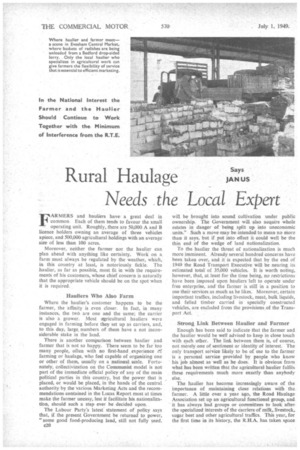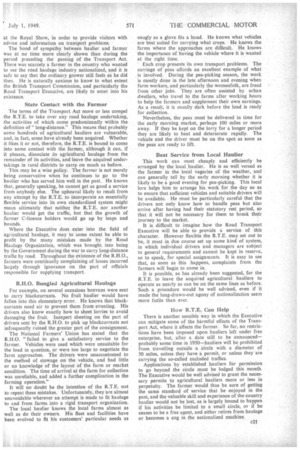Rural Haulage
Page 18

Page 19

If you've noticed an error in this article please click here to report it so we can fix it.
Says JAN US
Needs the Local Expert
ARMERSand hauliers have, a great deal in
common Each of them tends to favour the small .operating. unit. Roughly,. there are 50,000 A and Et licence holders owning an average of three vehicles apiece, and 500,000 agricultural holdings with. an average size of less than. 1.00 acres, • Moreover, neither the farmer nor the haulier can plan ahead with anything like certainty.. Work. on a farm must, always be regulated by the weather, which, in this country at least,. is notoriously fickle: The hautier, as far as possible, must fit in with the requirements of his customers, whose chief, concern is naturally that the appropriate vehicle should be on the spot when it is required.
Hauliers Who Also Farm
Where. the haulier's customer happens to be the farmer, the affinity is .even closer. In fact, in many instances, the two are one and the same; the carrier is also a grower. Most irgricultural hauliers were engaged in farming before they set up as carriers, and, tothis day, large, numbers of them have a not inconsiderable stake in the land,
There is another comparison between haulier and farmer that is not so happy.. There seem to be far too many people, often with no first-hand experiencec.P1 farming or haulage, who feel capable of organizing one or other of them, usually on a national scale. Fortunately; collectivization on the Communist' model is not part of the immediate official policy of any of the main political parties in this country, but the power that is placed, or would be placed, in the hands of the central authority by the various Marketing Acts. and the recommendations contained in the Lucas Report. must at times make the farmer uneasy, lest it facilitate his. nationalizatibia, should such a step ever be decided upon, The Labour Party's latest statement of policy says that, if the present. Government be returned to power, "some good food-producing land, still not fully used,
c20 will be brought into sound cultivation under public ownership. The Government will also acquire whole estates in danger of being split up into uneconomic units:" Such a move may be intended to mean no more than it says,. but if put into effect it could well be the thin end of the wedgeof land nationalization.
To the haulier the threat of nationalization is much more imminent Already several hundred concerns have been taken over, and. it is expected that by the end of 1.949 the Road Transport Executive will be nearing, its estimated total of 35,000 vehicles, It is worth noting, . however, that, at least for the. time being, no restrictions have been imposed upon hauliers left to operate under free enterprise, and the farmer is. still in a position to use their services as much as he likes. Moreover, certain important traffics, including livestock, meat, bulk and felled timber carried in specially constructed vehicles, are excluded from the provisions of the Transport Act.
Strong Link Between Haulier and Farmer Enough has been said to indicate that the farmer and the haulier would be well advised to keep in close touch with each other. The link between them is, of course, not merely one of sentiment or identity of interest. The only transport service likely to be of use to the farmer is a personal service provided by people. who .know his. job almost as well as he does. It is obvious, from what has been written that the agricultural haulier fulfils these requirements much more exactly than anybody else.
The haulier has become increasingly aware of the importance of maintaining. close relations with the farmer. A little over a year ago, the Road Haulage Association set up an: agricultural' functional grou.p and it has always had groups or committees to look after the specialized interests of the carriers of milk,: livestock,. sugar beet and other agricultural traffics. This year, for the first time. in its history, the RILA.. has, taken. space at the Royal Show, in order to provide visitors with advice and information on transport problems.
The bond of sympathy between haulier and farmer was at no time more dearly shown than during the period preceding the passing of the Transport Act. There was scarcely a farmer in the country who wanted to see the road haulage industry nationalized, and it is safe to say that the ordinary grower still feels as he did then. He is naturally anxious to know to what extent the British Transport Commission, and particularly the Road Transport Executive, are likely to enter into his existence.
State Contact with the Farmer
The terms of the Transport Act more or less compel the R.T.E. to take over any road haulage undertaking, the activities of which come predominantly within the definition of "long-distance." This means that probably some hundreds of agricultural hauliers are vulnerable, and, in fact, some have already been acquired. Whether it likes it or not, therefore, the R.T,E. is bound to come into some contact with the farmer, although it can, if it pleases, dissociate its agricultural haulage from the remainder of its activities, and leave the acquired undertakings in rural districts to carry• on much as before.
This may be a wise policy. The farmer is not merely being conservative when he continues to go to the haulier who has served him well in the past. He knows that, generally speaking, he cannot get as good a service from anybody else. The upheaval likely to result from any attempt by the R.T.E. to incorporate an essentially flexible service into its own standardized system might mean ultimately that neither the R.T.E. nor another haulier would get the traffic, but that the growth of farmer C-licence holders would go up by leaps and bounds.
Where the Executive does enter into the field of agricultural haulage, it may to some extent be able to profit by the many mistakes made by the Road Haulage Organization, which was brought into being by the Government during the war to carry long-distance traffic by road. Throughout the existence of the R.H.O., farmers were continually complaining of losses incurred largely through ignorance on the part of officials responsible for supplying transport.
R.H.O. Bungled Agricultural Haulage
For example, on several occasions boxvans were sent to carry blackcurrants. No fruit haulier would have fallen into this elementary error. He knows that blackcurrants need air to prevent them from sweating. His drivers also know exactly how to sheet lorries to avoid damaging the fruit. Inexpert sheeting on the part of drivers sent by the R.H.O. to pick up blackcurrants not infrequently ruined the greater part of the consignment.
The National Farmers' Union has stated that the R.H.O. "failed to give a satisfactory service to the farmer. Vehicles were used which were unsuitable for the load in question, or were too large to negotiate the farm approaches. The drivers were unaccustomed to the method of stowage on the vehicle, and had little or no knowledge of the layout of the farm or market condition. The time of arrival at the farm for collection was unreliable, and added a further complication in the farming operation."
It will no doubt be the intention of the R.T.E. not to repeat these mistakes. Unfortunately, they are almost unavoidable wherever an attempt is made to fit haulage to and from farms into a rigid transport organization.
The local haulier knows the local farms almost as well as do their owners. His fleet and facilities have been evolved to fit his customers' particular needs as
snugly as a glove fits a hand. He knows what vehicles are best suited for carrying what crops. He knows the farms where the approaches are difficult. He knows the importance of having the vehicle where it is wanted at the right time.
Each crop presents its own transport problems. The carriage of peas affords an excellent example of what is involved. During the pea-picking season, the work is mostly done in the late afternoon and evening when farm workers, and particularly the womenfolk, are freed from other jobs. They are often assisted by urban dwellers, who travel to the farms after working hours to help the farmers and supplement their own earnings. As a result, it is usually dark before the load is ready for collection.
Nevertheless, the peas must be delivered in time for the early morning market, perhaps 100 miles or more away. If they be kept on the lorry for a longer period they are likely to heat and deteriorate rapidly. The vehicle and the driver must be on the spotas soon as the peas are ready to lift.
Best Service from Local Haulier This work can most cheaply and efficiently be arranged by the local haulier. He is as well versed as the farmer in the local vagaries of the weather, and can generally tell by the early morning whether it is likely to be a good evening for pea-picking. This local lore helps him to arrange his work for the day so as to ensure that sufficient vehicles and suitable drivers will be available. He must be particularly careful that the drivers not only know how to handle peas but also arrive after having had their statutory rest period, so that it will not be necessary for them to break their journey to the market.
It is difficult to imagine how the Road Transport Executive will be able to provide a service of this character. However flexible the R.T.E. may set out to be, it must in due course set up some kind of system, in which individual drivers and managers are subject to general requirements and cannot be kept in reserve, so to speak, for special assignments. It is easy to see that, as soon as this happens, complaints from the farmers will begin to come in.
It is possible, as has already been suggested, for the R.T.E. to leave the acquired agricultural hauliers to operate as nearly as can be on the same lines as before. Such a procedure would be well advised, even if it made the long-drawn-out agony of nationalization seem more futile than ever.
How R.T.E. Can Help
There is another sensible way in which the Executive can mitigate some of the harmful effects of the Transport Act, where it affects the farmer. So far, no restrictions have been imposed upon hauliers left under free enterprise, but, after a date still to be announced— probably some time in 1950—hauliers will be prohibited from travelling outside a circle with a diameter of 50 miles, unless they have a permit, or unless they are carrying the so-called excluded traffics. Applications by established hauliers for permission to go beyond the circle must be lodged this month. -The Executive would be well advised to grant the necessary permits to agricultural hauliers more or less in perpetuity. The farmer would thus be sure of getting the same standard of service that he enjoyed in the past, and the valuable skill and experience of the country haulier would not be lost, as is largely bound to happen if his activities be limited to a small circle, or if he ceases to be a free agent, and either retires from haulage or becomes a cog in the nationalized machine.
































